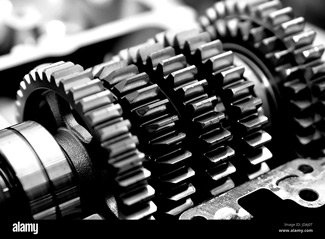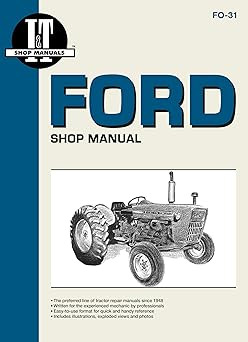* Home * DIY Tractor Maintenance * History of Ford Tractors * History of John Deere Tractors *
The Importance of Equipment Maintenance
-
 Tractors are workhorses designed to give you years of service. But like all workhorses these tractors sometimes need repair and always need quality maintenance. That is where you want a professional. A professional tractor mechanic will be able to diagnose mechanical issues and provide the maintenance that will keep that workhorse running. In addition, the experience of working on many manufacturers give us an insight to know where to look for potential mechanical failures. We are located just North of Wichita Kansas and can work at your location or you can bring your tractor to our shop. Our equipment services include:Equipment Repair:
Tractors are workhorses designed to give you years of service. But like all workhorses these tractors sometimes need repair and always need quality maintenance. That is where you want a professional. A professional tractor mechanic will be able to diagnose mechanical issues and provide the maintenance that will keep that workhorse running. In addition, the experience of working on many manufacturers give us an insight to know where to look for potential mechanical failures. We are located just North of Wichita Kansas and can work at your location or you can bring your tractor to our shop. Our equipment services include:Equipment Repair:We regularly work on New Holland, Ford, Massey Fergueson, John Deere, Case, and an occasional Mahindra. An advantage of this varied experience is that what we have learned about these tractors will help us diagnose yours.
The Essential Guide to Sub-Compact Tractor Maintenance:Sub-compact tractors are highly versatile machines that provide invaluable assistance in managing small farms, homesteads, and your landscaping projects. Despite their compact size, these tractors deliver impressive capabilities. However, regular maintenance is key to keeping them in peak condition.
This guide offers essential practices to ensure your sub-compact tractor remains reliable and durable for years to come. Routine maintenance is vital for the continued efficiency and safety of your sub-compact tractor. If you neglecting regular care it will eventually result in decreased performance, expensive repairs, and even hazardous situations. Proper maintenance not only boosts your tractor’s productivity and reliability but also helps preserve its resale value and extends its lifespan.
Basic Maintenance Schedule Daily Checks:
- Fluid Levels: Always check engine oil, hydraulic fluid, coolant, and fuel levels to ensure your tractor runs smoothly. Do not cut corners on tractor oils and maintenance items. The money you save will quickly be lost with one repair.
- Tire Inspection: Examine your tires for damage or low pressure to ensure optimal traction and performance.
- Visual Inspection: Look for leaks, loose bolts, or debris that could interfere with your tractor's operation.
- Regular Maintenance:
- Oil Changes: Follow the manufacturer's guidelines for oil type and change intervals to maintain engine health.
- Filter Replacements: Replace engine oil, fuel, hydraulic, and air filters at recommended intervals to ensure proper filtration and efficiency.
- Greasing Components: Lubricate pivot points, joints, and linkages regularly to prevent wear and tear.
- Inspect Belts and Hoses: Check for signs of wear such as cracks or fraying; replace any faulty belts or hoses to avoid breakdowns.
- Battery Care: Keep battery terminals clean, check electrolyte levels (if applicable), and ensure the battery is properly charged.
- Seasonal Maintenance:
- Cooling System: Flush and refill the coolant system as recommended by the manufacturer to prevent overheating.
- Winterization: Add fuel stabilizer, check antifreeze levels, and take steps to prevent freezing temperatures from damaging your equipment during winter.
- Summer Precautions: Ensure your tractor’s ventilation and cooling systems are functioning properly during the hot summer months.
Often Forgotten Items
 Follow the Manual: Always consult the manufacturer’s manual for specific maintenance, correct fluids, instructions and intervals for your tractor.
Follow the Manual: Always consult the manufacturer’s manual for specific maintenance, correct fluids, instructions and intervals for your tractor. - Keep Records: A detailed log of all maintenance activities, including dates and services performed. This can help you stay on top of upcoming maintenance needs. To help keep records we have created a maintenance log for you to download.
- Quality Parts: Yes, you can buy cheaper fluids at many farm cupply stores. When you buy name brand fluids that meet or exceed manufacturer specs you are likely reducing potential expensive repairs.
- Keep it Clean: Regularly clean your tractor to prevent the buildup of dirt, dust, and debris that could lead to corrosion or mechanical issues.
- Address Issues Promptly: If you notice any unusual noises or abnormalities, address them immediately to prevent minor issues from turning into costly repairs.
- Protective Storage: When not in use, store your tractor in a dry, sheltered location to protect it from harsh weather conditions. Conclusion
- Regular maintenance is crucial for keeping your sub-compact tractor running at its best. By following a proactive maintenance schedule and best practices, you can ensure your tractor remains a reliable, efficient, and safe asset for many years. A well-maintained tractor is not just an investment in machinery, but also a trusted partner in your agricultural or landscaping projects.
- Yes, you can do much of this maintenance yourself. However, you should have a professional mechanic look the entire tractor over from time to time.